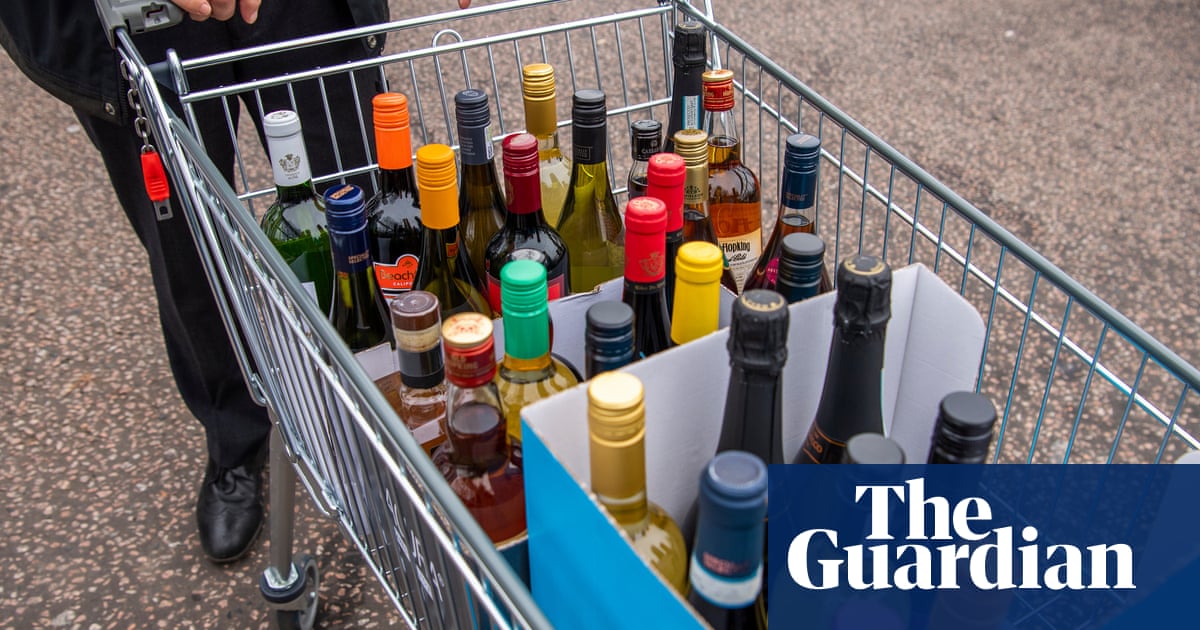Supermarkets such as Tesco, Aldi and Lidl are exploiting a tax loophole to produce and sell cheap cider that harms health and causes social problems, alcohol campaigners have claimed.
Over recent years, ciders – sometimes containing as much as 7.5% alcohol – have become cheaper or barely risen in price, despite the cost of beer, wine and spirits soaring, according to research byAlcoholChange UK.
Supermarkets are able to sell high-strength ciders at “pocket money prices” by taking advantage of a subsidy intended to boost apple production, Alcohol Change UK says.
It means that the cheapest ciderTescosells – Compton Orchard, which is 4% alcohol by volume (ABV) – now costs the same as the supermarket’s own-brand apple juice, at just £1 a litre. While the apple juice has risen 70% in cost since 2020, the cheapest cider costs 2.4% less now than the equivalent product then.
A 2.5-litre bottle of Frosty Jack’s cider, which is 7.5% ABV, has only increased in price by 5.3% since 2020 – from £4.89 to £5.15 – despite consumer price index inflation having been 26% over that time.
But the cost of a pint of cider bought in a pub has gone up since 2020 by an average of 15.5%, from £3.88 to £4.48, Alcohol Change UK’s research found.
Similarly, the cost of two litres of own-brand cider in bothLidland Aldi is still £1.99, even though Lidl’s own-brand vodka is 25% more expensive.
Under UK law, cider that is between 3.5% and 8.5% ABV is only taxed at £9.67 per litre of alcohol. That is just 46% of the £21.01 per litre of alcohol rate applied to beer.
Ash Singleton, Alcohol Change UK’s director of research and public affairs, said: “Big producers knock up a deadly product with just enough concentrated apple to legally call it cider – and pocket the tax breaks. Supermarkets drive the demand, stocking it high to flog at pocket-money prices.
“From unsafe streets to NHS pressure and early deaths, working-class neighbourhoods bear the brunt of this irresponsible profit racket left by the last government.”
Singleton urged ministers to “fix the system, starting by scrapping the super-strength subsidy”.
The charity has written to Ashley Dalton, the public health minister, saying the tax loophole “allows multinational companies to cash in on reliefs meant for genuine small UK-based cider makers”.
Sign up toFirst Edition
Our morning email breaks down the key stories of the day, telling you what’s happening and why it matters
after newsletter promotion
It said super-sized and high-strength cider was leading to early deaths. The charity said: “It is unacceptable that the alcohol industry continues to push the cost of harm on to communities and stretched NHS and police services, while cashing on tax breaks to do so.”
The British Retail Consortium, which represents supermarkets, did not respond to the disclosure that many ciders have barely risen in price while the cost of other alcoholic drinks has surged.
A spokesperson said: “Supermarkets have led the way in helping their customers drink responsibly, adopting the health department’s labelling to give customers clear information about the alcohol they sell and how that relates to recommended guidelines. Working with other partners, such as the Drinkaware Trust, this has helped deliver a fall in excessive drinking.
“Increasing duties on cider would penalise the vast majority of consumers who already drink less than the government’s recommended limits [of 14 units a week].”
Tesco said it did not sell super-strong cider. A spokesperson said: “We adhere to all UK pricing regulations on cider. Compton Orchard cider is 4% ABV, similar in strength to a regular lager, and we train our colleagues to use Think 25 and to ensure they sell all alcohol responsibly.”
Lidl,Aldiand Compton Orchard were approached for comment.
